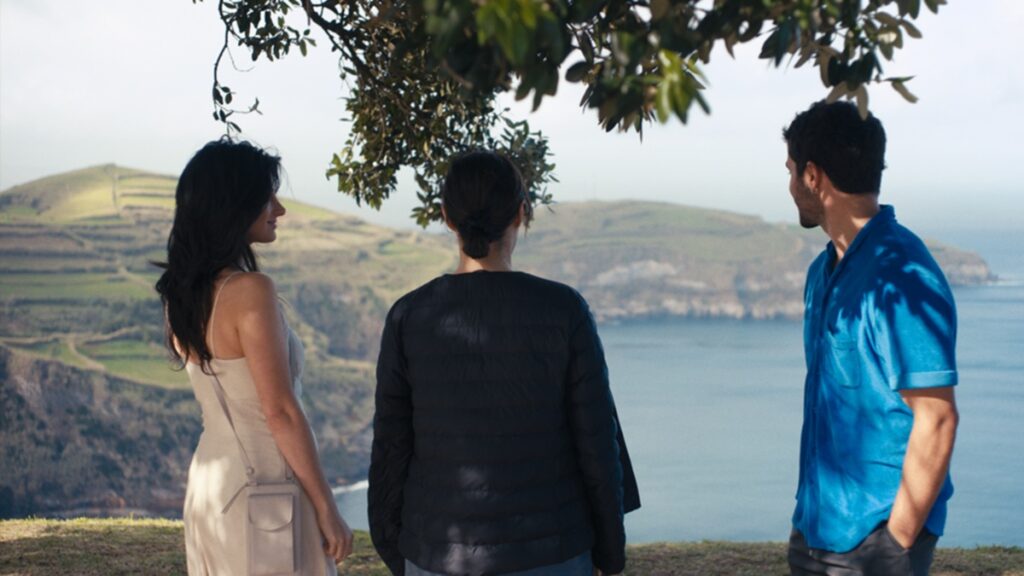A curious trend emerged across several films at this year’s Tribeca Festival: characters retreating to places not just to escape, but to dig up what they’ve tried to bury. In “A Tree Fell in the Woods,” two couples retreat to a remote cabin and find themselves unraveling as secrets surface and truths are confronted. In “Cuerpo Celeste,” a young woman returns to the site of a personal tragedy, quietly reckoning with all that she lost a year prior.
With “Honeyjoon,” Lilian T. Mehrel’s debut feature, that theme takes a sun-drenched detour to the Azores. On paper, this film promises to be a funny, sexy story about a mother-daughter vacation. Yet underneath the postcard charm and flirtatious setups lies something knottier: a story of two women processing shared grief through opposing means—and whether they’ll emerge from this trip closer than before, or even further apart.
A Haircut in a Plastic Bag (and Other Quiet Gut Punches)
From its opening moments, Mehrel signals that this won’t be your standard bonding dramedy between mother and daughter. June (Ayden Mayeri) is in the middle of self-pleasure when her mother, Lela (Amira Casar), inadvertently interrupts her by lying next to her and nonchalantly complaining about being constipated. June suggests they start exploring, but Lela insists on unpacking and resting instead, since they’ve just arrived on the island. It’s a funny and awkward beat, but one that reveals their emotional rhythms: they’re physically proximate (even sharing a bed), yet emotionally out of sync.
That disconnect sharpens in a later moment on a hillside. Lela tells June she has a gift: a plastic bag containing Dad’s final haircut. June stares, stunned into silence. “We can throw it in the water together,” Lela offers. “Can we just enjoy being here right now?” June replies, trying to deflect the weight of the moment. These scenes are both humorous and piercing—intimate reminders of a closeness that once existed, now fraying.
[More Tribeca 2025 Coverage: ‘On a String’: Isabel Hagen’s Viola-Playing Heroine Finds Humor in Stagnation]

Longing in the Sunlight
That same ‘Dad’ is why they’re thrust together in this vacation: They’ve come to the Azores to mark the anniversary of June’s father’s death—Lela’s late husband. Lela, a therapist deeply rooted in her Persian-Kurdish identity and mourning more than just a man (her homeland, her youth), sees the trip as a spiritual commemoration.
June, by contrast, wants warmth, laughter, maybe a hookup. However, what she actually craves is harder to articulate. There’s a sense of longing threaded through her every move. Though her age is never specified, June feels caught in a liminal space: no longer young enough to coast, not yet old enough to accept stasis. When a hotel staff mistakes them for sisters, we can see Lela trying not to break into a grin, and for good reason. Because June, well. We can feel her seething internally.
Moreover, June’s father’s death may not have initiated this internal drift, but it certainly intensified it. In terms of personal endeavors, she seems like someone who hasn’t found what she’s looking for; and she spends moments alone fantasizing about hotel staff or their guide João (José Condessa, charming and unforced) saying something intimate or affirming to her. You get the sense she’s trying to fill a space left hollow—not necessarily with sex, but with proximity, care, even distraction.
If Lela’s mourning is about honoring time and devotion, June’s grief is about absence, memory, and what it means to be unmoored. Lela suggests there was much June never knew about her father—including his mental health—and June’s response is quiet, not defensive but contemplative. It’s not that she wants to recreate his love through others, but in fumbling toward connection, even fleeting, she’s trying to anchor herself in a world that suddenly feels less clear.
Same Ocean, Different Boats
João becomes a point of emotional divergence for the two. June flirts openly, looking for fun or maybe a flicker of intimacy. Lela connects with him too, albeit through more philosophical conversations and shared reflections on memory and aging. As the trip wears on, emotional fissures widen between mother and daughter. Lela wants June to be careful, to “cover up,” to show respect, not just to others but also to herself. June rolls her eyes, tired of her mother’s hovering concern and subtle judgment.
The tension isn’t explosive but accumulative, through half-finished sentences, lingering glances, tone-policed observations. Each small moment layers into a portrait of two women trying to stay afloat in the same emotional ocean, but steering with very different maps. June, frustrated and aimless, clings to vitality and flirtation.
Conversely, Lela, stewing in memory and idealism, toggles between maternal protectiveness and exasperation. While neither of them quite know what they want from the other, they nevertheless both feel the absence of what once was.

An Incisive Study of Generational Divide
One of the complex threads in “Honeyjoon” is the generational and cultural divide between June and Lela, particularly around ideas of womanhood. Lela condemns the idea of women being shamed or repressed, especially in Iran. But under the same breath, she chastises June for showing too much skin or being “too much” in other ways. June, rightfully, sees the contradiction.
What’s notable is how Mehrel avoids staging this as a single cathartic blowout. Instead, the clash is embedded in everyday friction: passive comments, hurt silences, and conversations that slip away before they can reach resolution. It’s less about winning an argument and more about the slow erosion of understanding. So when the blowup happens midway through the film and Lela finally confronts June if the latter wished it were her instead who died, we feel all the passive-aggression coming like a deluge.
[Related Review: ‘Baba’ is an Offbeat Short Film About Generational Divide and Disconnect in Familial Relationships]
No Easy Healing, Just the Work of Staying Close
Mehrel’s directorial touch is strongest when it’s most invisible. That opening moment—June facing away from the camera, caught in her own head as her mother walks in—says more about their emotional divide than any monologue could. Meanwhile, Inés Gowland’s cinematography supports this restraint, bathing the island in soft natural light and letting the geography reflect the characters’ unsettled states. The Azores don’t just look beautiful; they feel like a liminal space between past and future, escape and reckoning.
Performance-wise, “Honeyjoon” rests on Mayeri and Casar’s beautifully textured work. Mayeri makes June feel sharp but vulnerable, selfish yet sympathetic. Casar, luminous and poised, balances Lela’s maternal warmth with a kind of self-serious righteousness that’s both frustrating and deeply human. They make sense together, even when they don’t—fighting, retreating, circling, reconnecting. They know how to press each other’s bruises. And sometimes, they also know how to hold them.

‘Honeyjoon’: A Tender—Albeit Tonally Uneven—Modesty War of the Heart
If “Honeyjoon” stumbles, it’s in its pacing. At just 80 minutes, it still feels baggy in parts. Adding to this, the tonal shifts—from flirtatious dramedy to political commentary—aren’t always clean, and some threads (especially around Lela’s past) could use deepening. But even when the film meanders, its emotional current keeps pulling forward.
For all the heartaches and hesitations, “Honeyjoon” doesn’t give its characters the comfort of closure. It leaves them (and in this instance, the audience, too) somewhere in between. And yet, watching these two women try—fail, resist, soften, and try again—feels honest.
Despite its uneven tone and pace, writer-director Lilian T. Mehrel manages to depict the complicated nature of grief, and the different ways people process it. And for people sharing the same grief-stricken skies, sometimes just the act of staying close, even when you’re tired, even when you’re not sure how, is its own kind of triumph.

Lilian T. Mehrel’s “Honeyjoon” had its world premiere last June 7, 2025, at this year’s Tribeca Festival. The film festival runs from June 4 to 15, 2025. Follow us for more coverage.


